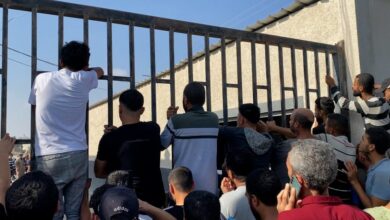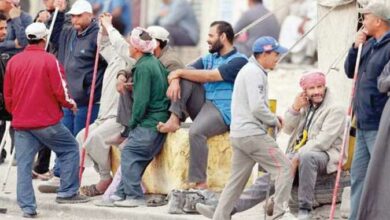Activists in human and labor rights have denounced the decree put forth by the interim government on Wednesday criminalizing strikes, protests, public congregations and street assemblies.
Such actions are to be criminalized as long as the Emergency Law is in effect; this law has been in force for the past 30 years, and is expected to remain in effect for another six months until parliamentary elections are held. Besides disagreement with the principle of the decree, activists also questioned the methods of its implementation.
The decree stipulates that protesters or strikers will be arrested, fined and/or imprisoned, with fines ranging from LE30,000 to LE500,000 (from $US5,000 to $US83,000), and prison sentences of one year or more. Even those promoting strikes or protests but not participating in them are subject to imprisonment and fines reaching up to LE50,000 (around $US8,300.)
The cabinet of Prime Minister Essam Sharaf issued a preliminary decree calling for the "immediate stoppage of all demonstrations and strikes". According to the Cabinet of Ministers' website, the interim government has been overloaded by the demands of protesters and striking workers, while the national economy has been harmed by such actions.
Karam Saber, Director of the Land Center for Human Rights, said that this decree was proposed in light of the stock market's historic losses and the arson attack by police on the Ministry of Interior a day earlier.
"Yet even with these events, there is no justification for a wholesale crackdown on civil society, and the freedom of expression," said Saber. "If crimes are committed, such as the arson attack, then the perpetrators must be brought to justice. But prohibiting Egyptians from their basic human rights is entirely unjust."
Saber told Al-Masry Al-Youm: "We are shocked by this proposed decree. We don't know when it will be enforced, we have no information about how it will be implemented. Who will assess whether or not these strikes and protests disrupt production or not? Will those who violate this decree be subjected to military tribunals, or will they stand trial before civilian courts? Is there a right to appeal verdicts or not? We know little to nothing about this bizarre decree."
The independent Center for Trade Union and Workers' Services issued a press release on Thursday in which it described the proposed decree as "a grave and disturbing development". The press release says that "workers have struggled for years to reclaim their right to strike," pointing out that workers' strikes were an integral part of the Egyptian revolution of 25 January. The CTUWS called on the Supreme Council of the Armed Forces to refrain from ratifying this decree.
On social networking sites such as Facebook and Twitter, young activists involved in the street protests leading up to the Egyptian revolution denounced the decree as violating basic human rights, including freedom of speech, expression and assembly. One youth activist wrote, "The government of Prime Minister Essam Sharaf has proven to be more repressive than of Hosni Mubarak. We are moving backwards not forwards!"
Many described the move as a problematic one for Sharaf’s government. Sharaf himself has assumed a degree of legitimacy as prime minister since appearing in Tahrir Square on his second day in office on 4 March. Appearing before protesters in the square, he promised to fulfill their demands. But while the abolition of the Emergency Law remains a key demand of the 25 January Revolution, the law remains in place and Sharaf appears merely to have built upon it.
Saber described the proposed decree as a "screaming violation of all treaties and conventions relating to human rights and labor rights which Egypt has signed and ratified." He went on to say: "On 13 March the Ministry of Manpower announced that workers' and unions' freedoms would not be infringed upon by the state or its administrative/executive apparatuses. Yet less than 10 days later they announce that workers will be arrested and put on trial for exercising their basic rights?"
He further criticized the proposed decree on the basis that it prevents workers and average citizens from collectively demanding their rights.
"Strikes function as a pressure mechanism on employers or administrators for the realization of rights. Without such pressure, employers have the ability to sack workers, halt payments, deny employees their rights, to carry on with corruption, and impose lockouts. A lockout halts production and harms the economy, but the government has no objection. It only objects to the simple folks' right to strike or protest," he said.
Some activists are determined to take to the streets on Friday to protest the law and re-state their unfulfilled demands, including the release of civilians from military prisons and the end of the Emergency Law. The 25 January Revolution Youth Coalition on Thursday called on Egyptians to take part in a Friday protest outside the Egyptian Radio and Television Union in Cairo against the law. The planned protest was dubbed “The Friday of Cleansing”, during which the protesters will demand the resignation of all officials loyal to the former regime of ousted President Hosni Mubarak, including those working for state TV and state-run newspapers.




